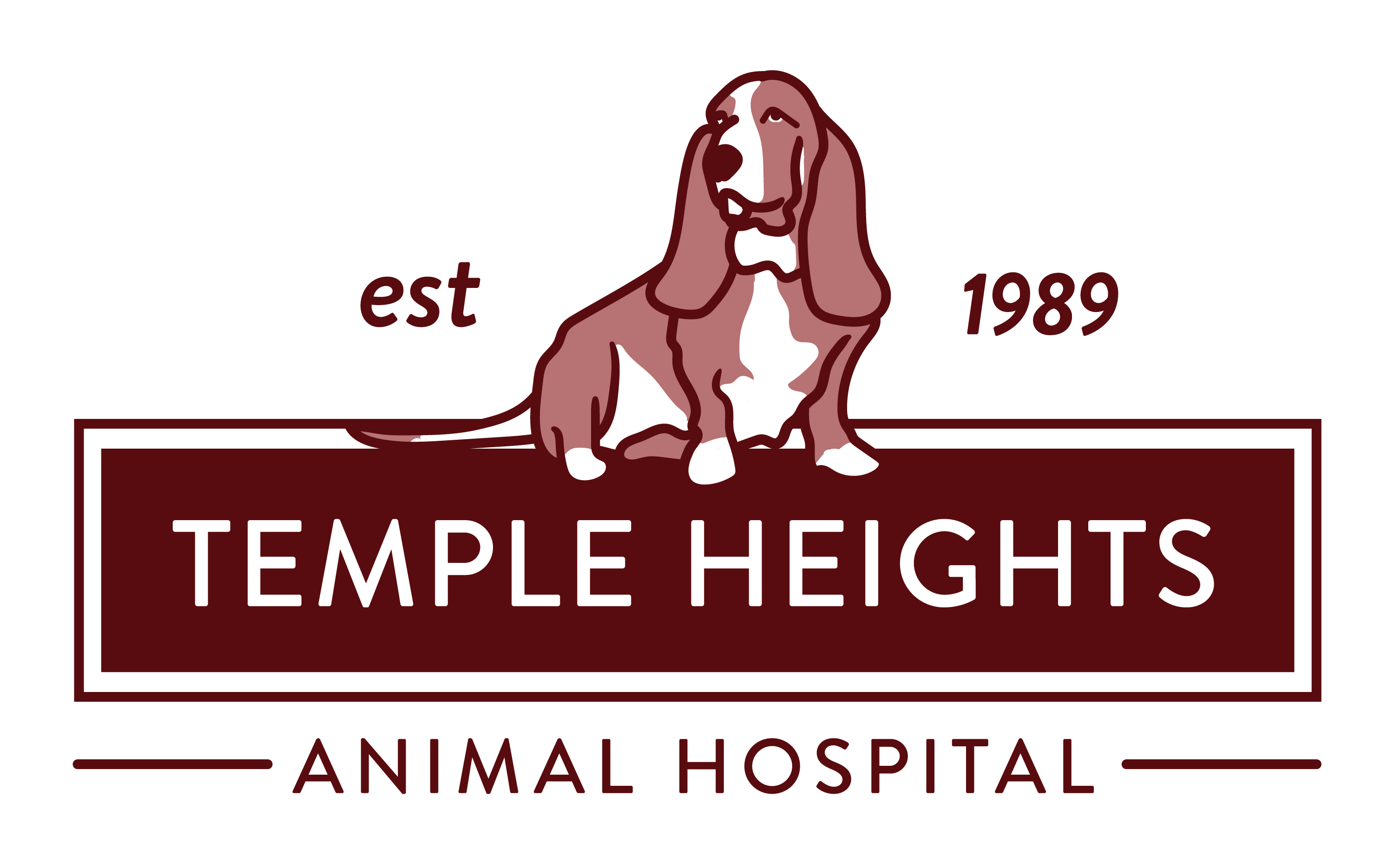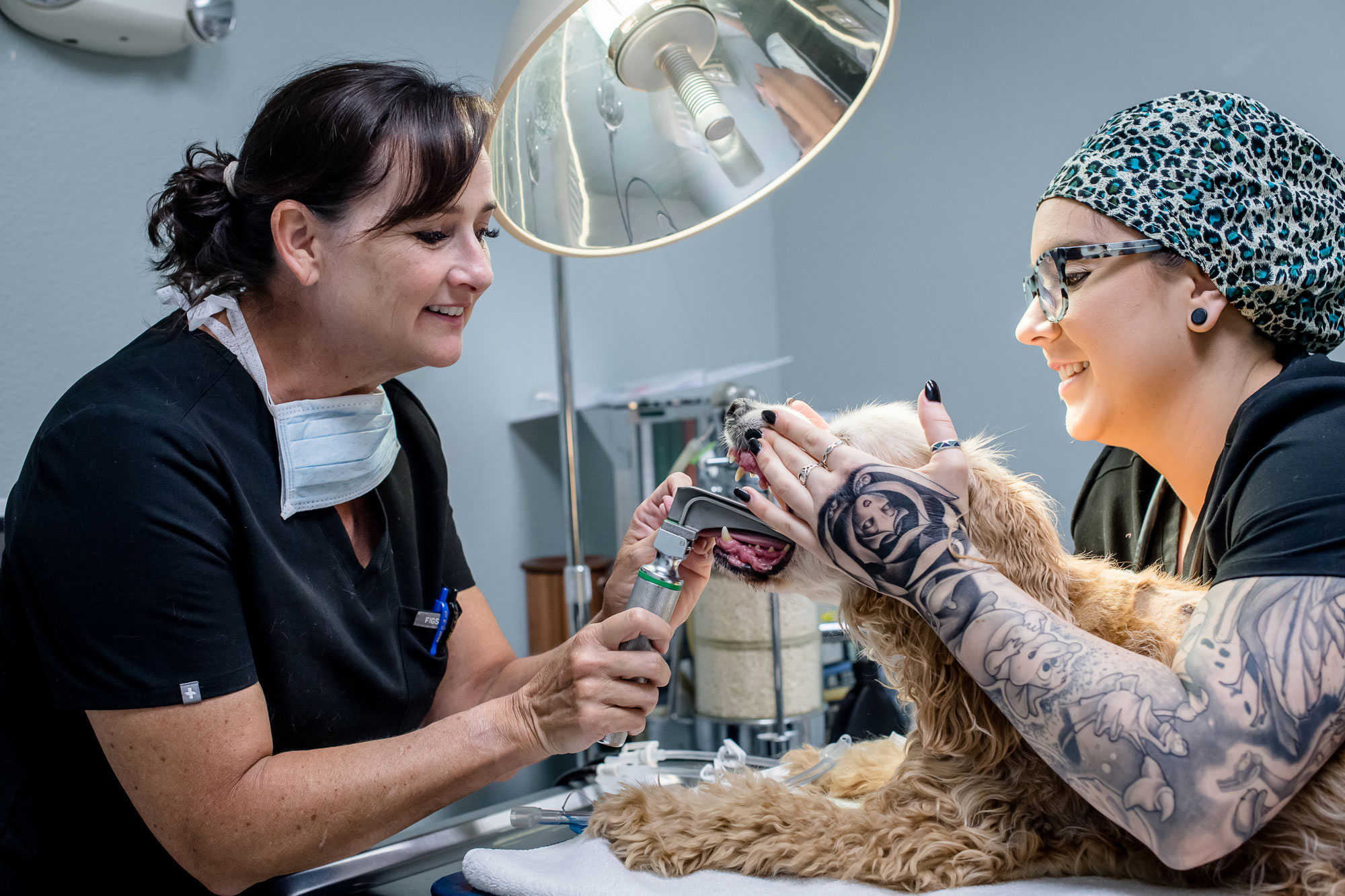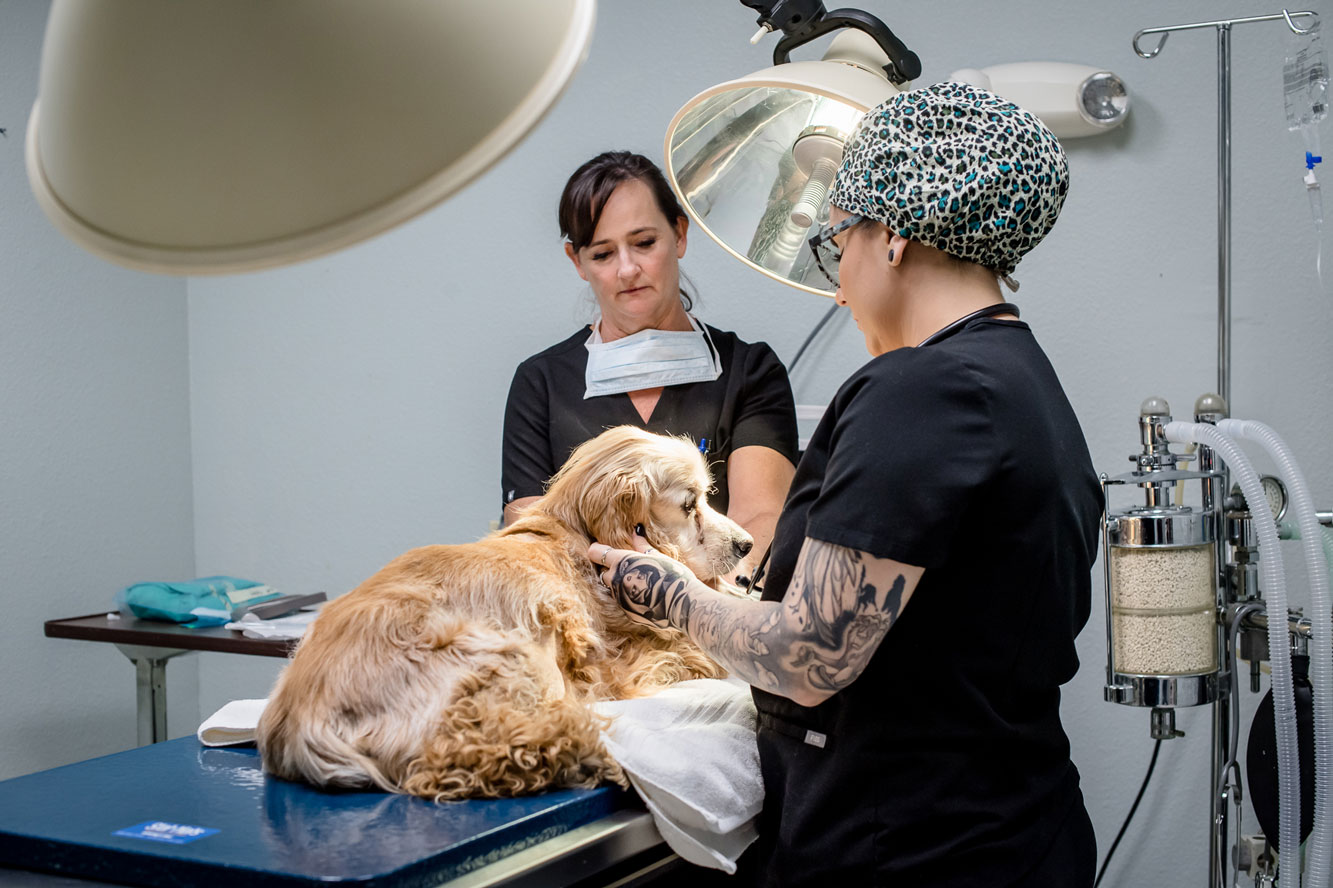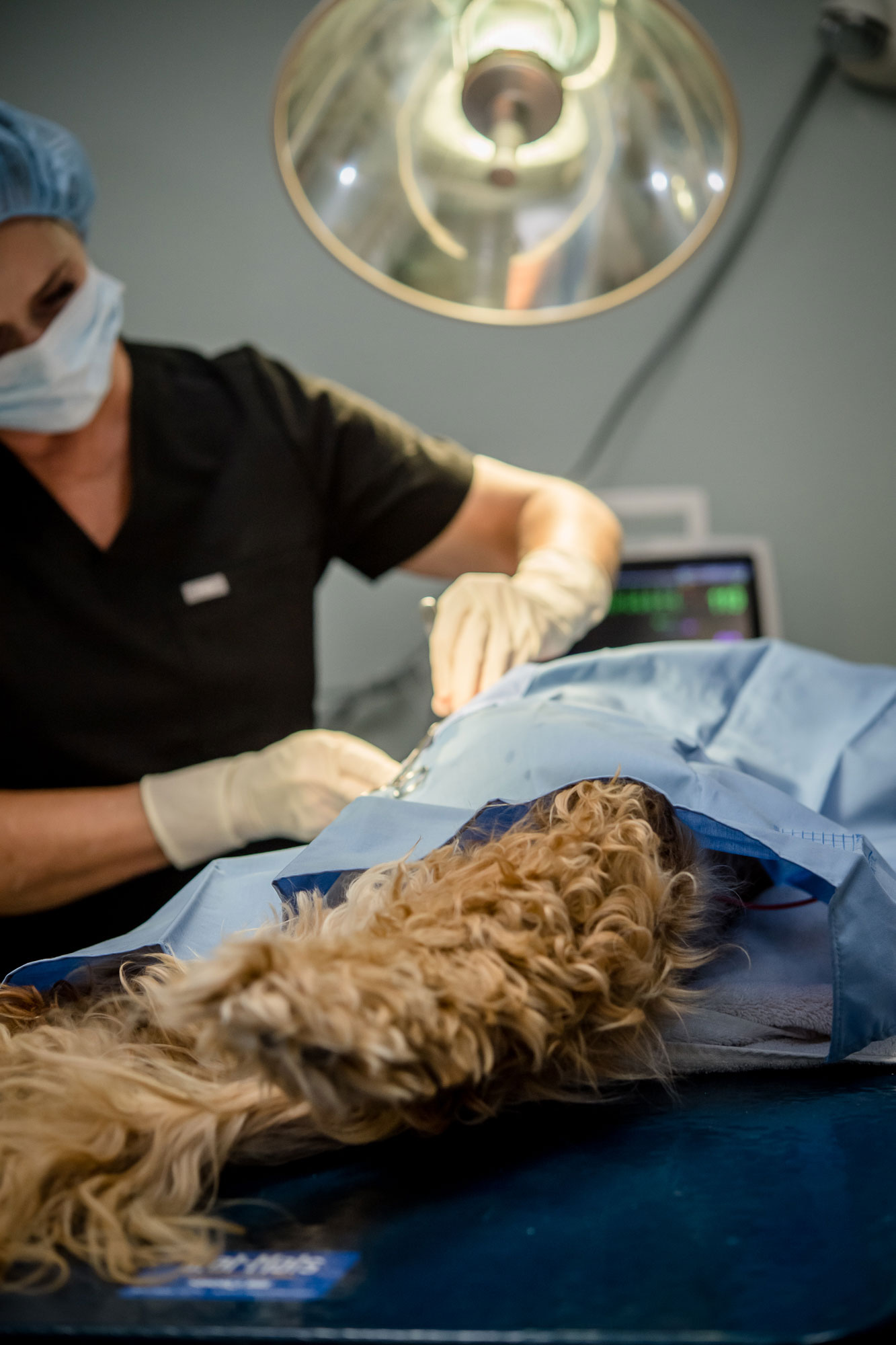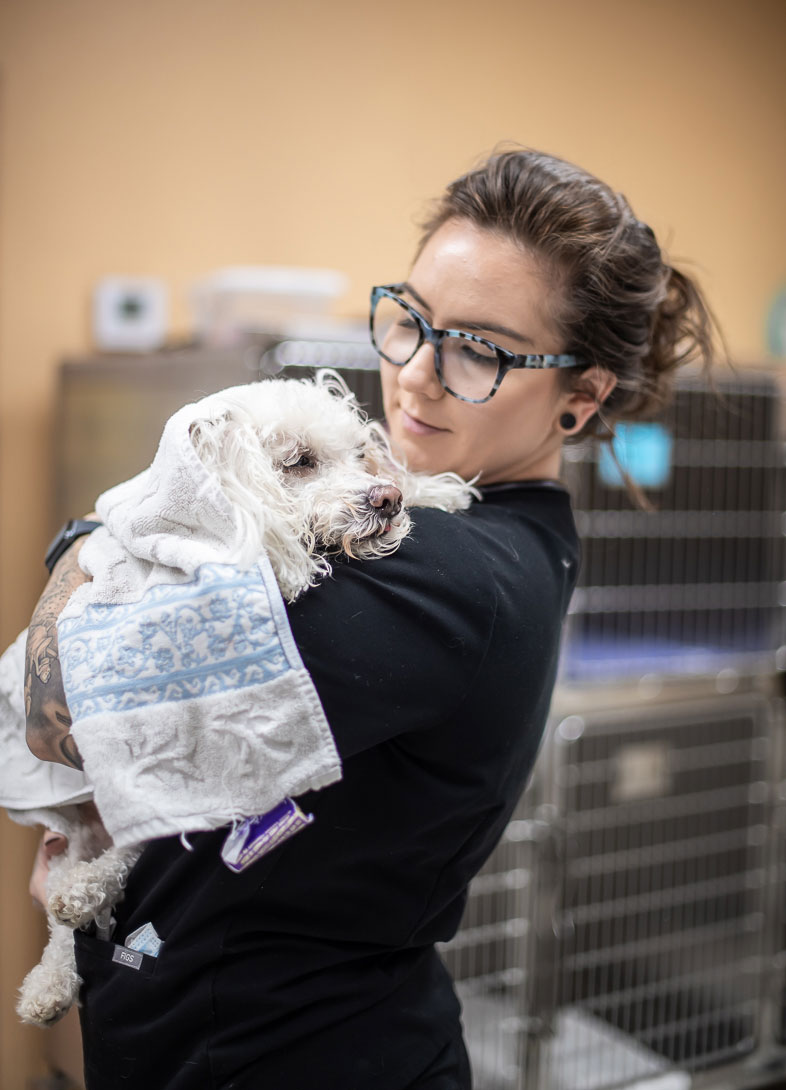Services
Professional veterinary services in Oceanside, CA.
Click a link below to jump to that section
Wellness Care | Diagnostic Services | Surgical Procedures | Dentistry | Pharmacy | Behavior | Urgent Care
Diagnostic Services
Temple Heights Animal Hospital is equipped with the best diagnostic technology that veterinary medicine offers.
Advanced diagnostic services are especially important in veterinary practice because your animal is not able to tell us where it hurts or how he or she feels. Veterinarians rely on various diagnostic procedures and lab tests to gain a complete picture of your pet’s health.
During your pet’s wellness exam at Temple Heights Animal Hospital, we allow ample time for the veterinarian to discuss your pet’s condition and answer your questions. If a wellness exam reveals potential concerns, our advanced diagnostic equipment helps your veterinarian make a complete and accurate diagnosis.
Some of our diagnostic services include:
• Laboratories
In-House Laboratory:
Our in-house pet diagnostic laboratory allows us to detect diseases and conditions such as intestinal parasites, urinary tract infections, heartworm disease, skin infections and yeast and or bacterial ear infections. Routine annual or bi-annual pet blood testing can help us detect early signs of disease such as diabetes, changes in liver or kidney function or simply provide a baseline for future reference.
Reference Laboratory:
For more specialized testing Temple Heights Animal Hospital has a close working relationship with one of the most comprehensive reference laboratories for diagnostic purposes. Our veterinarians usually get results within one day, so you don’t have to wait and worry about test results.
• Ultrasound
Temple Heights Animal Hospital performs ultrasound imaging for fast and accurate diagnostics. Ultrasound allows the doctor to achieve a depth of detail that is not possible with X-rays. It allows for precise biopsy and measurement of an organ.
Ultrasound is a painless non-invasive modern technique using safe sound wave energy. They produce very accurate real-time visual imprints of your pet’s interior organs. Ultrasound imaging is commonly used to scan various soft-tissue organs such as the heart, liver, spleen and kidneys. As with humans, ultrasound is also a very important diagnostic tool for evaluating a pet’s reproductive system and pregnancies.
Abdominal Ultrasound
Abdominal ultrasound allows the doctor to fully examine the stomach and intestines. Ultrasound examination of these organs is crucial when a diagnosis depends upon seeing inside an organ, or when surgery or anesthesia would not be desirable. Abdominal ultrasound is completely painless, and generally can be performed using no anesthesia or sedation. Abdominal ultrasound has revolutionized the study of liver disease, and is crucial in detecting many types of cancer.
Cardiac Ultrasound
The heart is a very complex organ. Animals can suffer from a wide variety of heart diseases just like humans. Most heart diseases are very treatable, and in most cases, animals can live normal lives once the nature of their condition is under control.
This is the area where ultrasound predominates. In order to correctly diagnose and treat these diseases, it is necessary to see inside the heart. The doctor can see the heart in motion, and examine precise chamber movement and view valve motion. It is possible using ultrasound to take accurate measurements of, for example, the heart’s size, wall thickness, chamber diameter, etc. Ultrasound also allows the doctor or technician to make before and after measurements of the heart, to help determine if a heart medication is working and/or how much we should adjust the dosage to help maintain optimum cardiac function.
• Radiology
• Electrocardiography
Probes are attached to the skin and waveforms are produced. The veterinarian is then able to determine how the electrical system of the heart is working. This is an extremely beneficial and painless procedure.
Surgical Procedures
Temple Heights Animal Hospital takes great care prior to, during and after pet surgical procedures. We view every surgical procedure as a major operation, from the more common spay to the complicated cases.
Surgery is performed only after an exam, pre-anesthetic blood panel, and anesthesia evaluation. Pain management is a priority in our surgical cases. We help your pet safely recover from surgery with comprehensive pain management, careful nursing care by our trained staff, special diets, and most importantly, gentle individualized attention and encouragement.
The Temple Heights Animal Hospital team remains current in the most recent advances in anesthesia and surgery by attending continuing education courses on a regular basis.
A partial list of surgeries that Temple Heights Animal Hospital performs includes (but not limited to):
- Ovariohysterectomy (spay)
- Castration (neuter)
- Lacerations and Abscesses
- Tumor Removal/Biopsies
- Anal Sacculectomy
- Abdominal and Intestinal Surgery
- Cystotomy, Urethrostomy
- Uterine Infections (Pyometras)
- General Ophthalmic and Eyelid Surgery
- Stomach: Tumor, Outflow Obstructions, Torsions
- Cesarean Sections
- Hernia Repair (Diaphragm, Inguinal)
- Tooth Extractions
• Anesthesia
• General Surgery
Temple Heights Animal Hospital performs various types of surgeries that fall into the “general surgery” category. General surgery is that category of surgery dealing with procedures outside of some of the specialty surgeries such as neuro surgery, ophthalmic surgery, orthopedic surgery, and plastic surgery. The majority of general surgery procedures involve the abdomen, skin, urogenital system, ears, and mass removals.
• Arthroscopic Surgery
• Spay/Neuter Surgery
There are many benefits to spay/neuter surgeries. Spay/neutered pets have less desire to roam the neighborhood in search of mates. This is helpful for pets since they are less likely to be injured, lost, or get into a fight. Spay/neutered pets are also less likely to bite or acquire other behavioral issues. Males have less desire to spray or mark their territory. Lastly, removal of the reproductive organs decreases the incidence of certain cancers as the pet ages.
In the larger picture, spaying and neutering is necessary to help with pet overpopulation. Millions of cats and dogs are euthanized yearly in this country because of overpopulation or not being adopted.
Pet Dentistry
Temple Heights Animal Hospital performs many standard pet dentistry services, from simple cleanings to oral surgery. Pets can have dental disease just like humans. Naturally, we highly recommend preventive care. If left untreated, plaque and tartar buildup can lead to tooth loss and cause other infections throughout the body. Your pet’s teeth and gums should be checked at least twice a year by a veterinarian to check for early signs of dental disease and to keep your pet’s mouth healthy.
Your pet’s mouth should be checked sooner if you observe any of the following problems:
- Bad breath
- Broken or loose teeth
- Extra teeth or retained baby teeth
- Teeth that are discolored or covered in tartar
- Abnormal chewing, drooling, or dropping food from the mouth
- Bleeding from the mouth
- Swelling in areas surrounding the mouth
- Inflamed gums
• Dental Disease
According to the American Veterinary Dental Society, 80% of dogs and 70% of cats show signs of oral disease by age 3. Indications of oral disease include bad breath, a change in eating or chewing habits, pawing at the face or mouth, or depression. If your pet is older than 1 year, or if any of these signs are present, please schedule your pet for a dental exam at Temple Heights Animal Hospital.
Just as in humans, bacteria, saliva, and food accumulate on your pet’s teeth, leading to the formation of plaque. If plaque is not removed with frequent brushing, gingivitis (inflammation of the gums) can develop. Plaque can lead to a buildup of tartar. Without proper dental care, plaque and tartar buildup can lead to serious periodontal disease. If left untreated, periodontitis can result in tooth loss. Your pet may not exhibit outward signs of pain. However, if your pet is experiencing later stages of dental disease, your pet is feeling discomfort and pain.
Symptoms of periodontal disease include yellow/brown tartar buildup along the gum line, red inflamed gums, and persistent bad breath. The infection caused by periodontal disease can enter the bloodstream, and potentially affect the heart, liver and kidneys.
Recommendations
- Schedule a dental exam and, if needed, a professional dental cleaning.
- Establish an at-home dental care regimen that includes regular brushing and a proper diet.
- Schedule regular follow-up checkups for your pet with the Veterinarian.
• Teeth Cleaning
Temple Heights Animal Hospital provides professional teeth cleaning under anesthesia. We measure for dental pockets, clean the teeth using an ultrasonic scaler, polish, and fluoride to treat your pets’ teeth. We also administer antibiotics and pain medications as needed.
Periodontal disease results from the action of oral bacteria in conjunction with your pet’s response to that infection. Both are responsible for the creation of periodontal pockets. Once a pocket forms, it serves as a hiding place for food, plaque, and calculus to accumulate. Eventually, the tooth will loosen, and if allowed to continue, this will result in the loss of supporting bone and the destruction of supporting gingiva.
• Digital Dental X-Rays
Temple Heights Animal Hospital offers state-of-the-art digital dental x-rays for a more precise diagnosis and quality care of your pets’ teeth. This provides a clear view of the underlying bone and tooth roots or any other pathology. Digital systems enable veterinarians to manipulate images on the screen. The specific area of concern on the x-ray can be enhanced or enlarged for better visualization of the pathology.
• Oral Surgery
Temple Heights Animal Hospital offers oral surgery for several types of procedures:
- Restoration of caries and enamel defects
- Feline dental resorptive lesions
- Tumors of the maxilla, mandible, and facial areas
- Surgical extractions of diseased teeth
- Therapy for oral inflammation
• Spay/Neuter Surgery
There are many benefits to spay/neuter surgeries. Spay/neutered pets have less desire to roam the neighborhood in search of mates. This is helpful for pets since they are less likely to be injured, lost, or get into a fight. Spay/neutered pets are also less likely to bite or acquire other behavioral issues. Males have less desire to spray or mark their territory. Lastly, removal of the reproductive organs decreases the incidence of certain cancers as the pet ages.
In the larger picture, spaying and neutering is necessary to help with pet overpopulation. Millions of cats and dogs are euthanized yearly in this country because of overpopulation or not being adopted.
Your pet’s dental health is important!
The most common dental disease in dogs and cats is periodontal disease, which develops early in life and gets worse as your pet matures if no preventative measures aren’t taken. By the age of 3, most pets will have some signs of periodontal disease. We can help!
Pharmacy
Temple Heights Animal Hospital maintains a complete inventory of pharmaceuticals, vitamins, shampoos, flea and tick control products and heartworm preventatives to meet the needs of your pet. We also carry a full line of prescription diets.
Pharmaceuticals
For your convenience, we have an in-house pharmacy that is stocked with most of the medications, dermatological products, and nutritional supplements that your pet needs. We can also have certain medications compounded into flavored suspensions to help with successful administration in difficult patients.
Pet Foods and Prescription Diets
We carry a large variety of Royal Canin and Purina prescription diets. These diets are usually intended for specific health conditions. Examples are kidney failure, diabetes, obesity, urinary stones, skin allergies, pancreatitis, colitis, etc.
Flea control products
We carry an assortment of different flea and tick preventions including Nexgard, Bravecto and Revolution Plus. Our staff can educate you on all of these products and make the best choice for your pets. Our pricing is competitive and is usually less than local pet supply stores. If we don’t carry a specific product you need, we can get it and send it directly to your home. We currently have great promotions running on all flea medications just ask us today and we will discuss which product is best for your pet.
• Online Pharmacy
Pet Behavior Counseling
Behavior Issues
Behavioral problems are the number one reason pets are taken to animal shelters. If you experience a behavioral problem with your pet, we offer examinations, counseling, behavior modification programs, and sometimes drug therapy to help resolve the issue. We can also refer you to veterinarians specializing in behavior medicine as the situation warrants.
Training
Temple Heights Animal Hospital refers pets with behavioral and training needs to Dog Dayz of California and Get Pawsitive Dog Training. Their contact information is:
Dog Dayz of California:
Location: 1995 Peacock Blvd
Oceanside, CA 92056
Phone: 760-631-DAYZ (3299)
Website: www.dogdayzofcalifornia.com
Get Pawsitive Dog Training:
Location: Serving Encinitas, Vista, San Diego and surrounding areas. Travel fees may apply.
Phone: 858-336-3590
Website: www.getpawsitive.com
Email Contact: [email protected]
Urgent Care
When it comes to pets, accidents happen. And they don’t usually make an appointment. With that in mind, our staff tries to accommodate last-minute, urgent injuries, and medical problems. Please call us if your pet needs a same-day appointment–we will do our best to get you in!
If your pet requires more care than we are able to provide, we will refer you to one of the following hospitals:
California Veterinary Specialists
(760) 670-4283
2310 Faraday Ave. Carlsbad, CA 92008
Click here to visit their website.
Ethos Veterinary Specialty Hospital
760-466-0600
2055 Montiel Road #104 San Marcos, CA 92069
Click here to visit their website.
CONTACT
HOURS
Mon-Fri: 8:30am-6:00pm
Sat-Sun: Closed
LOCATION
4750 Oceanside Blvd.
Suite A2
Oceanside, CA 92056
Get in touch!
Have a question? Our team is here to help!

Request an Appointment
Save time and request your next appointment online. We look forward to seeing you!

Download Our App
We are proud to work with PetDesk and offer our clients a wonderful way to keep up with their pet's care.
